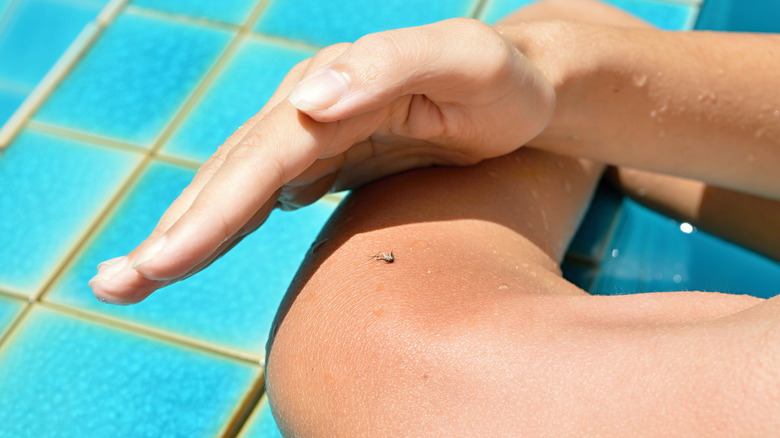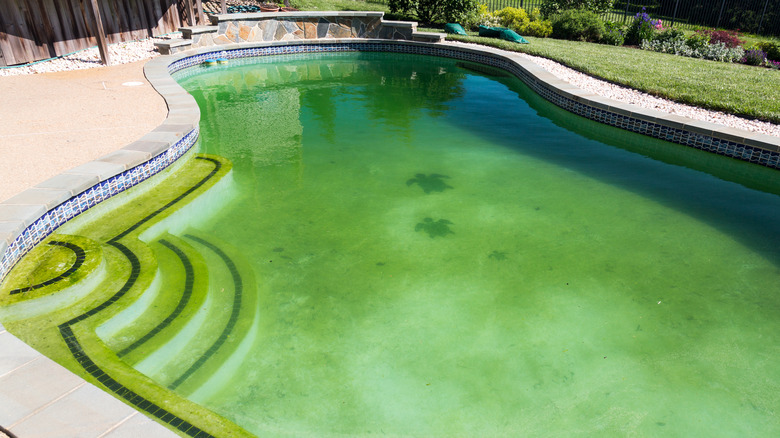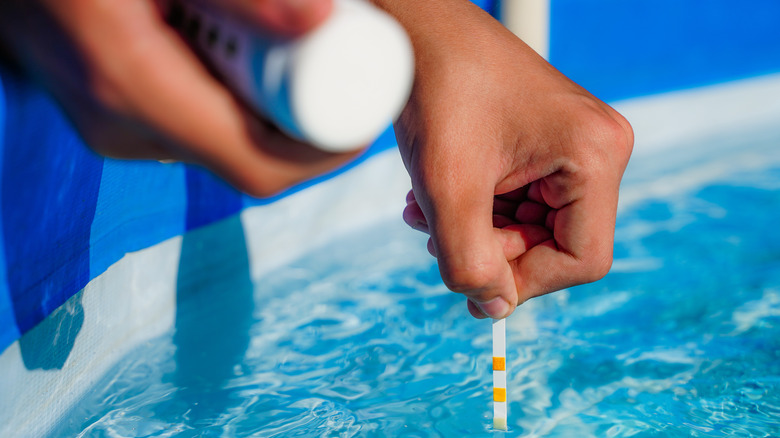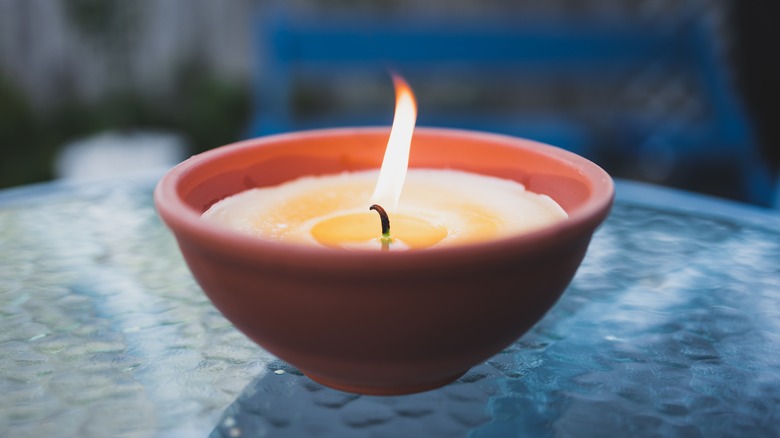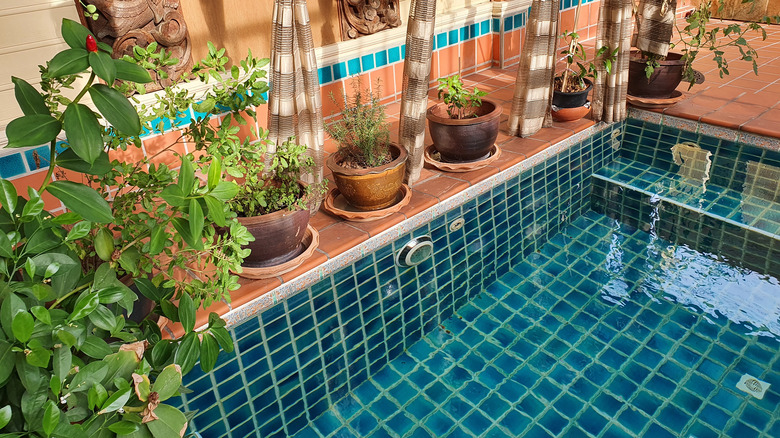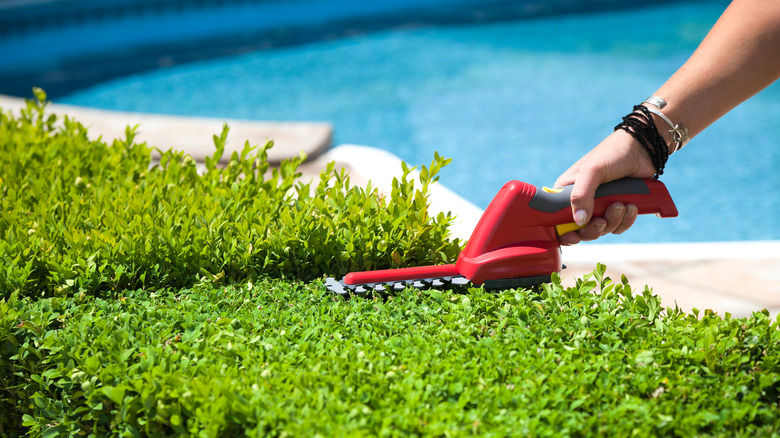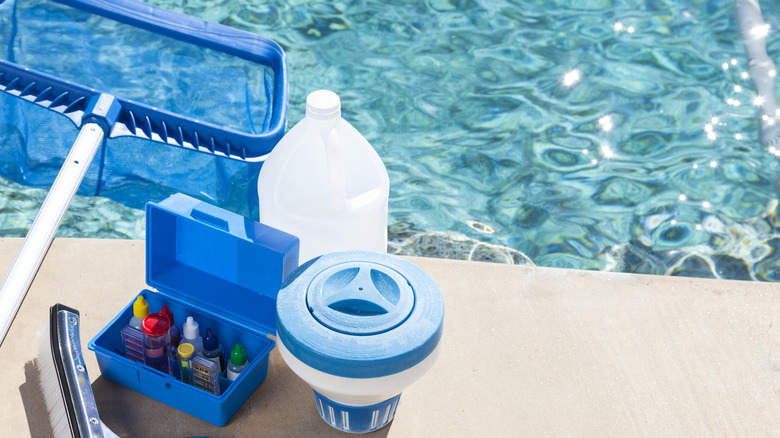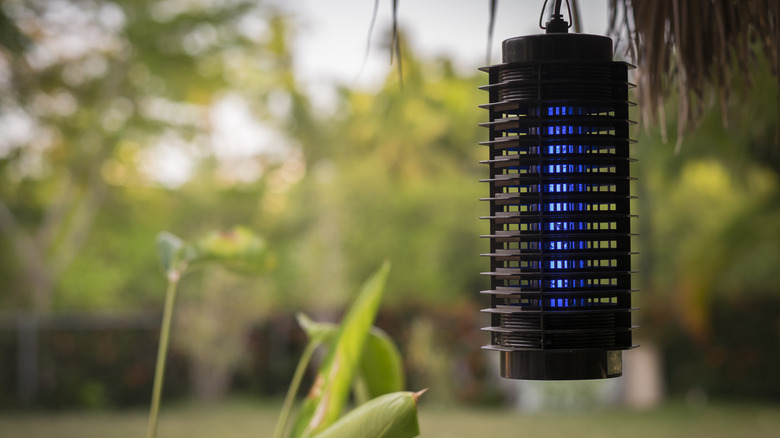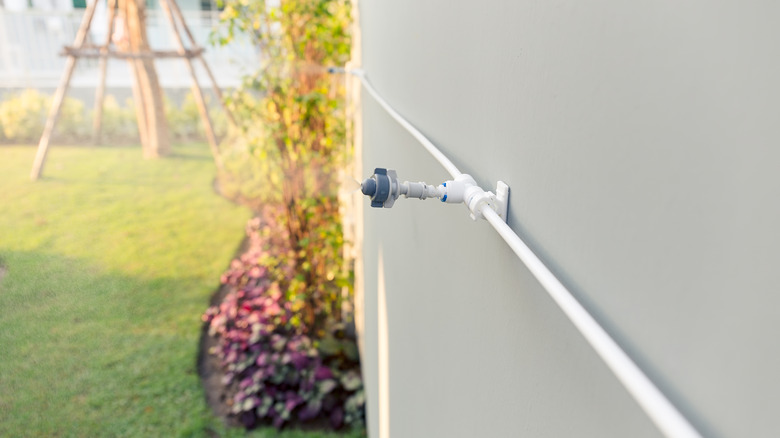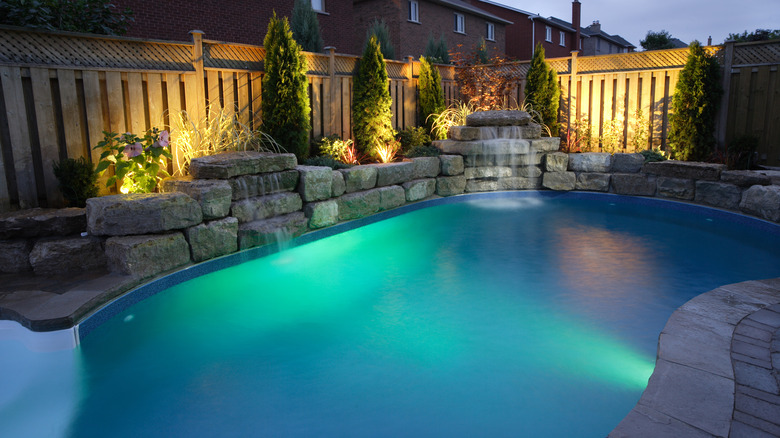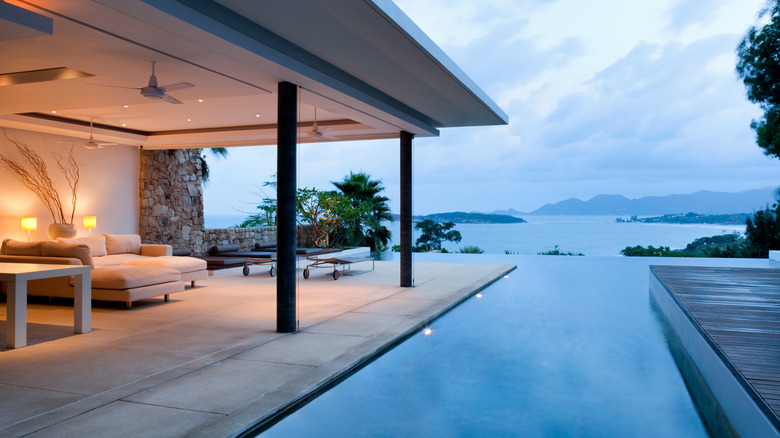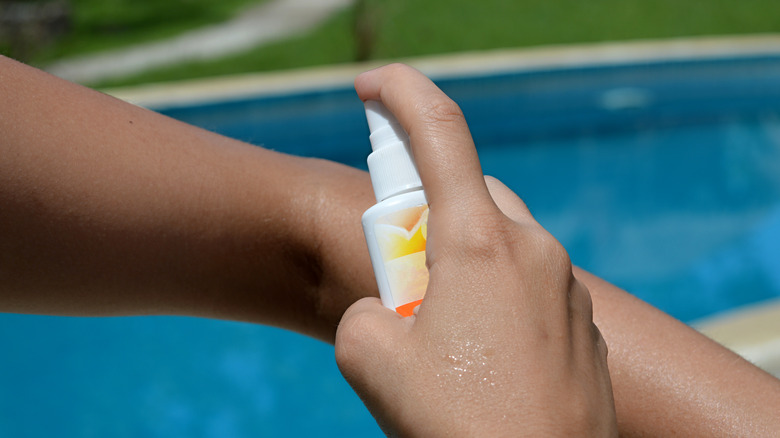How To Easily Keep Mosquitoes Away From Your Pool
At best, mosquitoes are an itchy nuisance, at worst, they can transmit some very nasty diseases. With nearly 200 species of mosquitoes buzzing around in the U.S., it is important to implement some effective pest control measures. Using DEET repellents can keep us safe from mosquitoes (and some other types of bugs who just love to nibble on human flesh). Plus, there are also several natural bug repellents that will help keep these critters out of your outdoor living spaces.
But despite your best efforts, you may find that your swimming pool is still a mosquito magnet. Before you call in pest control, there are a number of simple, low-cost, ways to stop this insect invasion in its tracks. Time to up your pool maintenance game, invest in some tried and tested repellents, and say bye-bye to mosquitoes for good. Here are several proven methods of keeping the blood-suckers away from your swimming pool.
Remove any stagnant water
Mosquitoes love stagnant water in buckets, planters, bird baths, and trash containers, and they have a penchant for poorly maintained pools. Stagnant water is very attractive to female mosquitoes, who like to lay their eggs in it. It only takes about a week for an egg to become a flying mosquito, so you may quickly find yourself overrun if you don't practice good pool maintenance.
It's important to keep your pool's water clean, free of debris, and regularly circulating through the filtration system. Make sure your filters are in good shape and that the system is running between four and eight hours a day, even when the pool is not in use. If it's unlikely to be used for an extended period of time, consider draining it completely. Don't forget to regularly remove any stagnant water from pool toys and inflatables as well as standing rainwater on your pool cover.
Maintain pool chlorine levels
Keeping your pool chlorinated at the correct level is a really important part of its maintenance. You should regularly chlorinate your pool, keeping the pH level between 7.2 and 7.8. This should be tested regularly to ensure that you are operating at the correct level. Pool chlorine prevents the growth of algae and other mosquito food sources. It also makes the water inhospitable for laying eggs and growing larvae.
There is a process of intense pool chlorination known as 'shocking', which involves using chlorine granules or liquid in an intense hit to eradicate algae growth and get rid of larvae lurking in the water. You don't need to call in an expert, as this can be safely done by pool owners. Plan on shocking the pool in the evening when everyone has stopped swimming to avoid the extra chlorine irritating swimmers' skin and eyes. It is also a good idea to test and shock the water if needed after a period of hot weather or heavy rainfall. These conditions can affect the pH level of the pool water, allowing mosquitos to thrive.
Light a candle as a natural repellent
If you are trying to keep these airborne pests away while you chill poolside, citronella candles are a popular choice. This works by masking scents that are attractive to mosquitoes, such as human sweat and floral perfume, making it difficult for them to locate their target to feed. However, while it might smell great, the effectiveness of citronella as a bug deterrent is up for debate. The scent actually may not offer significantly more protection than any other smoke-producing candle.
So, you may find that any candles you have lurking in the kitchen cupboard may be enough to do the trick. If you are looking for options that are also pleasant on the nostrils, mosquitoes also hate the smell of lavender, peppermint, rosemary, and lemongrass eucalyptus. So, it may be worth trying these fragrances in a diffuser, spray, or candle form to keep these pests at bay.
Invest in some mosquito repelling plants
If you are looking for a more long-term solution, rather than lighting up a candle, why not plant out a few mosquito repelling plants around your pool area? As mentioned above, lavender, rosemary, lemongrass, eucalyptus, and peppermint plants are all great natural repellents. As well as looking and smelling beautiful (to human noses, at least) these are all relatively easy to maintain, so they are great choices for the busy summer swimming season. You could also try basil, garlic, and catnip to keep away the biting bugs. However, some of these plants do need to be crushed in order to release the active ingredient.
To maximize the effectiveness of these deterring plants, you'll want them near the water. So, create container gardens to mix and match them and station them poolside. Not only will they help keep bugs away, but groupings of planters can help add height and dimension to an otherwise flat pool deck.
Keep the yard around your pool neat
Just as it is important to keep on top of cleaning your pool, it is equally important to look after the garden surrounding the area to make it unattractive to mosquitoes. These pests love places to hide, such as tall grass and overgrown bushes and shrubs. Instead of making things easier for them, dig out your lawn tools and get to work. Mowing your lawn, trimming bushes and hedges, removing weeds, and cleaning your pool deck will help to deter mosquitoes from setting up home. Any piles of grass clippings should be disposed of as they can make the perfect hiding place for mosquitoes trying to shelter from the wind.
Don't neglect your outside areas during the fall as pool season is coming to a close. Piles of wet leaves and dead, rotting branches are very attractive to mosquitoes looking to lay their eggs. Remember, only female mosquitoes bite — another reason to not want your pool and yard to become an egg-laying site.
Try a mosquito dunk
If you have fallen behind on your pool maintenance, don't worry. A type of larvicide known as a mosquito dunk can be used in untreated swimming pool water and in standing water on pool covers. These disc-shaped tablets contain a naturally occurring bacteria that kills mosquito larvae in a few days and are great for bodies of water that can't be drained quickly. All you have to do is dissolve a tablet in your pool water, per the manufacturer's directions, and the treatment will remain effective for 30 days, at which time it will need to be repeated. Depending on the size of your pool, you may need to use more than one dunk at a time.
Compared to other pest control measures, mosquito dunks are environmentally friendly and are safe for humans, pets, and neighboring wildlife. They can be used as a preventative measure, but on the downside, mosquito dunks only kill the larvae and not fully-grown mosquitoes. If you already have a serious problem and many breeding sites, then you may need to use more than one dunk or combine these with other measures.
Install mosquito traps around the pool
Mosquito traps capture or kill mosquitoes, stopping them in their tracks. There are a variety of options currently available on the market, but their prices and effectiveness vary. Some units are self-contained and use propane or batteries as a power source. So, these don't need to be situated near an electrical outlet, which is ideal if you have a large amount of outside space to cover.
These devices lure in the insects by using light, heat, or carbon dioxide, which mimics humans exhaling. Some traps rely on a sticky surface to trap the mosquito, some resort to electrocution, while others suck the pests in using a fan. Although they can capture an impressive number of mosquitos if used correctly, you'll have to keep any with electrical components a safe distance from your pool. The success of these traps also depends on a number of factors, including the species of mosquito, wind velocity, and trap placement, so make sure you read the instructions properly before purchasing and installing.
Use an eco-friendly misting system in your pool area
Misting systems can be an effective method for clearing a large area of mosquitos quickly. This involves a series of nozzles that emit chemicals at regular intervals to kill any mosquitoes in the vicinity. However, using insecticides in these systems can harm pollinators, like bees and butterflies, and even people and pets that are exposed unintentionally. And, using chemical misting systems can also cause insecticide resistance in mosquitoes, so you could end up worsening the problem.
However, these setups can still be a great way to repel mosquitoes without resorting to harsh chemicals. You can simply use an environmentally friendly concentrate to fill your misting system. These disperse organic or non-toxic ingredients like citronella and lemongrass into the air. Not only are these options safer for kids and pets, but they are better for the local wildlife too. Plus, they'll fill your pool area with a delightful scent to make your swim more enjoyable.
Reconsider your lighting choices
Did you know that your pool lighting may be responsible for drawing more mosquitoes to your outdoor space? Mosquitoes are more attracted to blue and green LED lighting rather than the yellow-orange part of the color spectrum. If this sounds like your current lighting setup, then it may be time for a rethink. Have the underwater bulbs in your pool swapped for smart ones that you can set to less bug-friendly colors like warm white or red.
You can also consider swapping any bright lighting around your pool deck for bug bulbs. These can be used for everything from landscaping illumination to string lights. These are basically yellow-hued bulbs that give off a warm glow that mosquitoes and other bugs find much more difficult to see. It's not a foolproof method of insect control but it certainly makes locating your pool area a lot more difficult for them.
Buy an outdoor fan
Buying a fan sounds like a simple idea, but it is oh-so-effective. For all their aggressive blood-sucking, mosquitoes don't have particularly strong wings. And, the average mosquito is no match for the airspeed of the humble fan. So when you are taking a swim, strategically power up an outdoor fan that can blow these insects off course. Plus, you'll enjoy the added benefit of a cool and breezy pool deck.
The stronger and faster the airflow, the more effective it is at keeping these airborne pests at bay, and luckily there are lots of exterior-rated options on the market. If you have a pergola or covered pool deck, install an overhead outdoor fan or two. Or, if you go out to swim and find that bugs are particularly bad, set up a portable battery-powered one to blow over the area. Just make sure to keep it a safe distance from the water.
Apply appropriate mosquito repellent
You may be using every single piece of advice on this list, but you should still slap on appropriate mosquito repellent before heading to the pool. Just make sure to choose a repellent that has been approved by the United States Environmental Protection Agency (EPA). The gold star repellent is DEET, which is effective against mosquitoes, fleas, and ticks, while lemon or eucalyptus oils are good choices for those wanting a natural alternative. It is important that you choose a repellent that has been tested and approved in order to keep the likes of Aedes mosquitoes, responsible for transmitting Zika and other nasty diseases, at bay.
Whichever mosquito repellent you choose, make sure you always follow the instructions on the label. If you don't apply it correctly, you won't have full protection. And if you are planning on going for a swim, make sure to reapply when you get out of the water.
